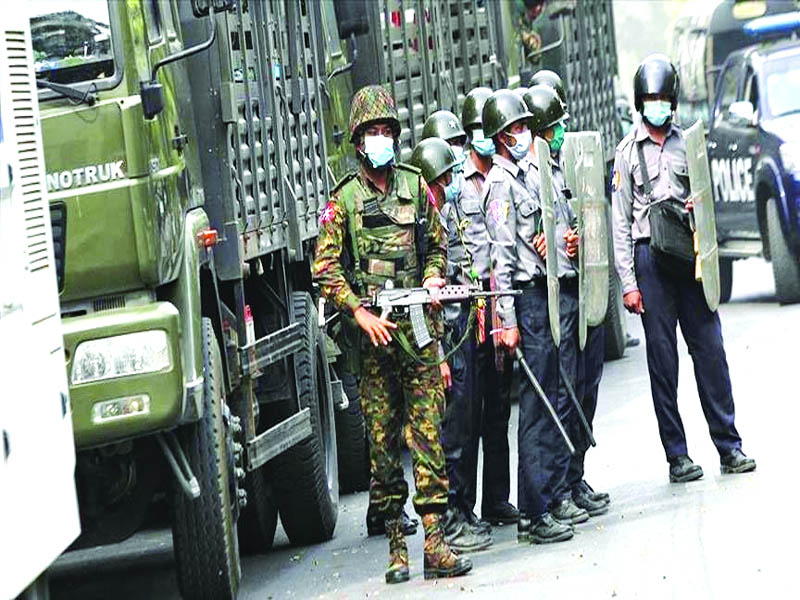New Delhi has abandoned the democratic forces in Myanmar, practising realpolitik to deal with the Govt of the day, not the elected Govt
Military coups usually end in instant success or instant failure. The coup in Myanmar has lasted more than two years and has reached a stalemate. The Resistance forces consisting of the National Unity Government (erstwhile National League for Democracy and Peoples Defence Forces allied with Ethnic Armed Organisations) are putting up a stiff fight. They appear to have some external support. The junta is in control mainly in urban centres while PDF and EAO control most of the rural areas. Senior General Min Aung Hlaing is the undisputed leader with his corps commanders loyal to him although desertions have taken place – 6000 police and 2000 Army have crossed over. But elite units are intact. On 10 April military air strikes killed 100 civilians supporting the opposition. On 17 April of 17500 prisoners, 3000 were released to mark the lunar new year.
At one stage, there was speculation the army's high command could split and the coup dissipate. But that has not happened because the stakes are very high for soldiers. For the last 78 years, they have run the country bar a decade 2011-2020 when hybrid civil-military rule was in place. Military casualties are known to be high – one estimate puts army/police at 10,000 and PDF at 1200. The State Administration Council runs the country of 54mn people which is the poorest in South East Asia. Nearly 4 to 5mn people have fled the country excluding 1mn Rohingyas who were forced out before the coup. Another 1.2 mn have become internally displaced persons.
As both sides call each other ‘terrorists’ there is little hope of reconciliation as direct talks between junta and NUG have not materialized. The Asean Five-Point Consensus brokered in April 2021 has failed to take off as Asean is badly divided with Thailand, Vietnam, Laos and Cambodia pro-military and remaining Indonesia (current chair) Malaysia, Brunei, Singapore and the Philippines taking a hard line. Last month a Track 1.5 level dialogue was held in Bangkok with all stakeholders besides Asean members attending. Here too, there were more divergences than commonalities. The immediate need is a ceasefire, the release of prisoners and humanitarian assistance for people trapped in the fighting.
The junta has pledged to hold elections in August and the Election Commission has decreed new electoral laws. Political parties were to register by 31 March and as NLD did not, it was dissolved. By military courts awarding 76-year-old NLD leader Aung San Suu Kyi 33 years in jail, the junta has ensured the elimination of the most popular party which won the 2020 elections overwhelmingly. The new laws relating to funding, banning parties with links to terrorist groups, securing 100,000 members within three months, and establishing offices in half of 330 towns. Election laws will be altered to ensure Union Solidarity Development Party (Military) wins as it did in the 2010 elections.
There are as many as 90 political parties in the fray. As the junta has ruled for more than two years under emergency rule, acting President Myint Swe said on state TV that it was against the constitution. Elections if held will be a sham as the junta’s writ runs only across only 20 per cent of the territory though it has been negotiating with certain EAOs and declared a unilateral ceasefire. The military admires the Thai model where three former Army chiefs run a civilian party that wins elections. But Myanmar will have its own model with changes in the 2008 constitution which was drafted by the military.
At the recent Director General Police conference in New Delhi, three papers circulated dealt with North East and Act East policy. They recalled how China exploited Indian insurgencies and provided weapons to insurgents. The biggest casualty of the civil war in Myanmar is India’s Act East policy. Former Army Chief, Gen MM Naravane at a seminar in March on Myanmar: Two Years After the Coup, said that the Act East policy has an inner and external dimension. Both have to be addressed with a focus on the development of the northeast. He said India should provide electricity to villages across the border to have friendly population there.
As a consequence of violence, more than 100,000 refugees including some lawmakers have crossed over into Mizoram and Manipur. Mizoram acted with alacrity and humanity to welcome refugees while the central government had ordered they be pushed back. Similarly, fencing the border has been opposed by people on both sides. One of the reasons for insurgency was the mishandling of people residing along the border.
India’s premier projects central to Act East Policy like the trilateral highway connecting India with Asean and the multimodal Kaladan road/port project are in a mess though Ports and Shipping Minister S Sonowal said recently Sittwe port will be inaugurated soon. It is key to the development of the northeast but is stuck due to fighting in the Rakhine state. The investment at Sittwe port can fructify only once the Arakan Army which Indian security forces engage, can pacify Rakhine.
A truce between the Arakan Army and Junta will allow the projects to prosper. Chinese presence on Myanmar’s Coco Island will pose a threat. New Delhi has made hard choices virtually abandoning NLD and democratic forces, and practising realpolitik to deal with the government of the day, not the elected Govt. Keeping other options is a prudent policy.
(The writer, a retired Major General, was Commander, IPKF South, Sri Lanka, and founder member of the Defence Planning Staff, currently the Integrated Defence Staff. The views expressed are personal)


























